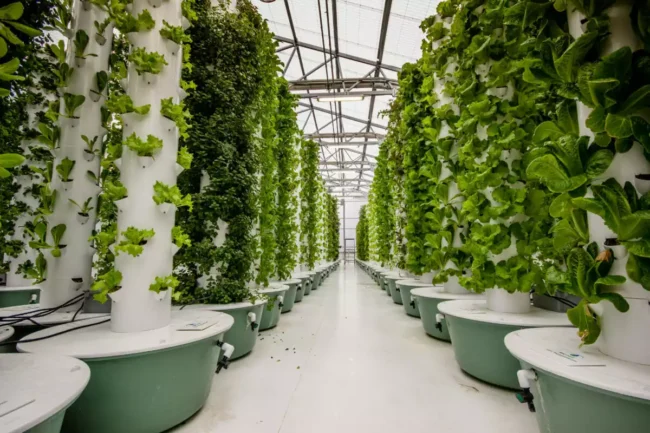Vertical farming is revolutionizing urban agriculture. This innovative approach involves growing crops in vertically stacked layers, often in controlled indoor environments. It offers a promising solution to meet the food demands of growing urban populations while addressing environmental concerns. In this article, we explore what vertical farming is, its benefits, and how it’s shaping the future of urban agriculture.

What is Vertical Farming?
Vertical farming is a method of growing crops in stacked layers, either in a building or on a skyscraper. This technique can be used in both indoor and outdoor environments. It maximizes space usage and can be integrated into urban settings, where land is limited. Vertical farms often use hydroponic or aeroponic systems to nourish plants without soil.
Benefits of Vertical Farming
1. Space Efficiency
Vertical farming utilizes vertical space, allowing multiple layers of crops to be grown in a single footprint. This approach makes efficient use of available land and can be implemented in urban areas where space is at a premium.
Fact: Vertical farms can produce up to 10 times more food per square foot compared to traditional farming methods.
2. Reduced Water Usage
Vertical farms use hydroponic or aeroponic systems that require significantly less water than conventional farming. These systems recycle water and nutrients, reducing waste and conserving precious resources.
Pro Tip: Vertical farming can cut water usage by up to 90% compared to traditional soil-based farming.
3. Lower Carbon Footprint
By growing food closer to urban centers, vertical farming reduces the need for transportation. This leads to lower greenhouse gas emissions associated with food transport and distribution.
Insight: Local production from vertical farms can decrease the carbon footprint of food by reducing transportation emissions.
4. Enhanced Food Security
Vertical farming can increase food security by providing a reliable and consistent food supply. It allows for year-round production, regardless of weather conditions or seasonal changes.
Fact: Vertical farms can operate in any climate and produce fresh food throughout the year.
5. Improved Crop Yields
Controlled environments in vertical farms provide optimal growing conditions for plants. This results in higher crop yields and can reduce the impact of pests and diseases.
Pro Tip: Vertical farming systems can enhance crop yields by providing ideal light, temperature, and nutrient conditions.
Key Technologies in Vertical Farming
1. Hydroponics
Hydroponics is a method of growing plants in nutrient-rich water instead of soil. It allows for precise control over nutrients and can lead to faster plant growth and higher yields.
Fact: Hydroponic systems use up to 90% less water than traditional soil-based agriculture.
2. Aeroponics
Aeroponics involves growing plants in an air or mist environment with nutrient solutions. This method improves oxygen availability to plant roots and can enhance growth rates.
Insight: Aeroponic systems can reduce water usage and increase nutrient efficiency.
3. LED Lighting
LED lighting provides plants with the specific light wavelengths they need for optimal growth. It is energy-efficient and allows for precise control over light conditions.
Pro Tip: LED lights can be adjusted to mimic natural sunlight and support various stages of plant growth.
4. Climate Control Systems
Climate control systems regulate temperature, humidity, and CO2 levels within vertical farms. This ensures that plants grow in ideal conditions year-round.
Fact: Advanced climate control can optimize growing conditions and improve plant health.
Challenges and Considerations
While vertical farming offers many benefits, it also presents challenges:
- Initial Costs: Setting up a vertical farm can require significant investment in technology and infrastructure.
- Energy Use: Maintaining controlled environments and LED lighting can lead to high energy consumption.
- Technical Expertise: Operating advanced systems requires specialized knowledge and skills.
COMMENTS